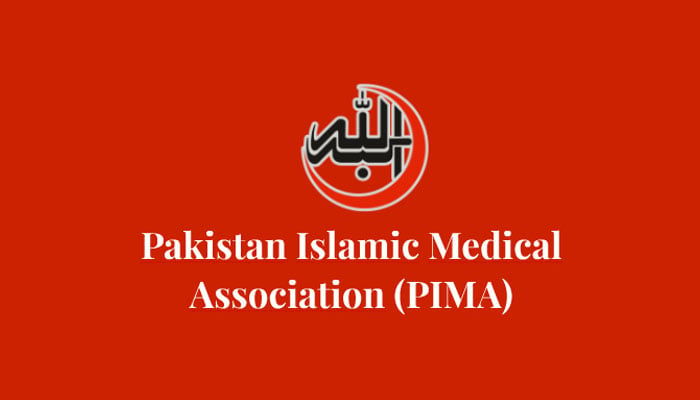PIMA upset over DRAP notice to doctors
Islamabad: The Pakistan Islamic Medical Association (PIMA) has expressed deep concern over DRAP's notification directing doctors to prescribe generic names of medicine instead of brand names.
Dr. Khubaib Shahid, Central President of PIMA, said in a statement on Friday that unplanned actions will have a negative impact on the healthcare system. It is not the jurisdiction of DRAP to issue instructions to doctors to write trade names or generic names of drugs. Regulatory bodies, including the Pakistan Medical Commission and the health department, have a responsibility to issue any such directive. The relevant government departments should issue a policy statement in this regard.
Dr. Khubaib added that this practice is taking place in many countries of the world, but it has only become possible after systematic planning and the establishment of infrastructure. First of all, there should be specified appropriate procedures to test the quality of hundreds of pharmaceutical companies in the country. Doctors deal directly with patients and they gain confidence in certain brands after years of using different medications. This move could shift the choice of medicine to medical stores that have no quality control experience. As a result, a new door of corruption or mismanagement may open, and it will affect only to patient or common man.
“PIMA strongly condemns any such move. In the past, such measures have not had a significant effect. As a result government had withdrawn that move. The implementation of any such decision without infrastructure should be avoided,” Dr. Khubaib said in a statement.
-
 Ethan Hawke Reflects On Hollywood Success As Fifth Oscar Nomination Arrives
Ethan Hawke Reflects On Hollywood Success As Fifth Oscar Nomination Arrives -
 Tom Cruise Feeling Down In The Dumps Post A Series Of Failed Romances: Report
Tom Cruise Feeling Down In The Dumps Post A Series Of Failed Romances: Report -
 'The Pitt' Producer Reveals Why He Was Nervous For The New Ep Of Season Two
'The Pitt' Producer Reveals Why He Was Nervous For The New Ep Of Season Two -
 Maggie Gyllenhaal Gets Honest About Being Jealous Of Jake Gyllenhaal
Maggie Gyllenhaal Gets Honest About Being Jealous Of Jake Gyllenhaal -
 'Bridgerton' Star Luke Thompson Gets Honest About Season Five
'Bridgerton' Star Luke Thompson Gets Honest About Season Five -
 Prince William On Verge Of Breakdown Because Of 'disgraced' Andrew
Prince William On Verge Of Breakdown Because Of 'disgraced' Andrew -
 Tig Notaro Reflects On Oscar Nod For 'Come See Me In The Good Light': 'I Was Sleeping'
Tig Notaro Reflects On Oscar Nod For 'Come See Me In The Good Light': 'I Was Sleeping' -
 Kenyon Sadiq Sets 40-yard Dash Record At NFL Scouting Combine, Eyes First Round
Kenyon Sadiq Sets 40-yard Dash Record At NFL Scouting Combine, Eyes First Round -
 Talk Show Host Drops Hint About Taylor Swift, Travis Kelce Wedding Date
Talk Show Host Drops Hint About Taylor Swift, Travis Kelce Wedding Date -
 Andrew Scandal Brings New Worries For Prince Harry, Meghan Markle
Andrew Scandal Brings New Worries For Prince Harry, Meghan Markle -
 King Charles Imposes New Restrictions On Ex-Prince Andrew In Surprise Move
King Charles Imposes New Restrictions On Ex-Prince Andrew In Surprise Move -
 Chris Hemsworth Reveals How Elsa Pataky Guides His Career Moves
Chris Hemsworth Reveals How Elsa Pataky Guides His Career Moves -
 Was Travis Barker In A Relationship With Kim Kardashian Before Marrying Her Sister?
Was Travis Barker In A Relationship With Kim Kardashian Before Marrying Her Sister? -
 Brad Pitt Feeling Down In The Dumps After Kids' Snubs As Pals Continue To Paint Angelina Jolie A Villain
Brad Pitt Feeling Down In The Dumps After Kids' Snubs As Pals Continue To Paint Angelina Jolie A Villain -
 Ex-PM Speaks Out On Andrew Mountbatten-Windsor In Newspaper Column
Ex-PM Speaks Out On Andrew Mountbatten-Windsor In Newspaper Column -
 Eric Dane Remembered In Glowing Tribute By Trans Activist In 'Grey's Anatomy'
Eric Dane Remembered In Glowing Tribute By Trans Activist In 'Grey's Anatomy'




